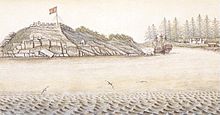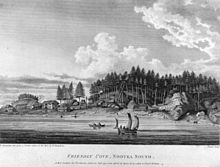Yuquot, also known as Friendly Cove, is a small settlement on Nootka Island, off Central Vancouver Island. The quiet today belies its past when it was the thriving summer home to the Mowachaht/Muchalaht First Nations and the point of first European contact in British Columbia. Visitors can learn about the history and take in some of the marvelous scenery in the area.
Understand
[edit]
Yuquot means "where the wind blows from many directions". The site is believed to have been inhabited for over 4,300 years and is culturally and spiritually significant to the local Mowachaht/Muchalaht First Nations. Before European contact, Yuquot was their summer home — sustaining a village of over 1,000 people — and one of their centers for whaling.
James Cook
[edit]James Cook visited and named Friendly Cove in 1778, making uneasy but cordial contact with the community. Cook's two ships spent about a month in Nootka Sound, from 29 March to 26 April 1778, in what Cook called Ship Cove, now Resolution Cove, at the south end of Bligh Island, about 8 km (5.0 mi) east across Nootka Sound. Over the month-long stay, the Yuquot "hosts" essentially controlled the trade with the British vessels, instead of vice versa. Generally, the natives visited the British vessels at Resolution Cove, instead of the British visiting the village of Yuquot at Friendly Cove.
Cook's Third Voyage journals were officially published in 1784, and aroused great interest in the fur-trading potential of the region. Even before 1784, unauthorized leaked bits had already set British merchants' eyes on the possible profits to be made. Cook's visit to Nootka Sound would later be used by the British in their claim to the region, even though Cook made no effort to formally claim possession. Spain countered by citing Juan Pérez, who had anchored in Nootka Sound in 1774.
Nootka Crisis
[edit]
By the late 1780s, Nootka Sound was the most important anchorage on the northwestern coast. Russia, Britain, and Spain all made moves to occupy it for good. The King of Spain, Carlos IV, issued the Royal Order of 14 April 1789, requiring the establishment with "honour and firmness" of a colony at Nootka Sound. In May 1789, a Spanish expedition from Mexico, under commander Jose Esteban Martínez, arrived and erected Santa Cruz de Nuca (or Nuca), including houses, a hospital, and Fort San Miguel, the first European colony in British Columbia. He found three ships already there, British and American commercial ships, which had come for the maritime fur trade, and to build their own permanent post at Nootka Sound. Martínez seized them and their crews, starting the so-called Nootka Crisis between the Spanish Empire, the Kingdom of Great Britain, and the fledgling United States of America. On 24 June, Martínez even dared to perform a formal act of sovereignty, in front of the British and Americans present, taking possession of the entire northwest coast for Spain, and went as far as using the impounded crews as forced labour for strengthening Fort San Miguel's ramparts. Both sides called for war. The natives, having little clue about what was happening, tried to maintain neutrality.
On 29 July, 1789, the Spanish supply ship Aranzazu arrived from San Blas, with orders from Viceroy Flores to evacuate Nuca by the end of the year. By the end of October, the Spanish sailed back to Mexico with two English ships, with their captains and crews as prisoners, as well as one American. Neither the king, nor the new viceroy, Juan Vicente de Güemes Padilla Horcasitas y Aguayo, 2nd Count of Revillagigedo, who had replaced Viceroy Flores, or San Blas commandant Juan Francisco de la Bodega y Quadra, was aware of the abandonment of Nuca until December 1789, when Martínez arrived at San Blas. Francisco de Eliza's expedition to relieve Martínez at Nootka became one to reoccupy the site and establish a permanent settlement, arriving on 3 April, 1790. There were no Europeans present when they arrived.
George Vancouver
[edit]
Spain's key ally France also mobilized their navy, but later announced they would not go to war. Without French help, Spain had little hope against the British and their Dutch ally, and proposed concessions for a diplomatic solution. Negotiations were to take place at Nootka Sound in the summer of 1792, for which purpose Juan Francisco de la Bodega y Quadra came. The British negotiator was George Vancouver, who arrived on 28 August 1792. He and Vancouver exchanged many cordialities, and even the maps they had made, but no agreement was reached; they decided to await further instructions. However, they also decided to name Nootka Sound's larger island as Quadra and Vancouver Island. It was later shortened to simply Vancouver Island as Spanish influence declined.
Aftermath
[edit]By 1793, Britain and Spain had become allies in a war against France, and the issues of the Nootka Crisis became much less important. An agreement was signed on 11 January 1794, under which both nations agreed to abandon Nootka Sound, with a ceremonial transfer of Friendly Cove to the British on 28 March 1795. The British flag was ceremoniously raised, lowered, and presented to Maquinna and the Mowachaht people, who were asked to raise it whenever a ship appeared. Santa Cruz de Nuca's far northerly position ultimately made it the "highwater mark" of verified northerly Spanish settlement along the North American Pacific coast.
The Mowachaht people continued to live in Yuquot after contact with Europeans but due to a number of reasons, the population declined. As of 2020, only six people, the Williams family of the Mowachaht band, plus two full-time lighthouse keepers, live here.
The Canadian government has declared Yuquot a National Historic Site due to the social, economic and political importance of the site to the Mowachaht/Muchalaht First Nations, its importance as a site of early contact between First Nations and Europeans, and the Nootka Crisis.
Get in
[edit]Yuquot's only accessible by boat or floatplane. You can catch either from Gold River, which is the nearest roadhead and the end of BC Hwy 28.
By boat
[edit]Arriving by boat is the most practical way to get in. Accessing Yuquot will be by using the 1 dock. Commercial operators and recreational boaters use the dock.
- MV Uchuck III, ☏ +1 250-283-2515, toll-free: +1-877-824-8253. W & Sa only, last week of June through first week of Sep. Departs Gold River at 10AM and Yuquot at 2PM. An old minesweeper that ships cargo and passengers around Nootka Sound now. It provides twice weekly service between Gold River and Yuquot during the summer. Trip time is 2-2.5 hours in each direction. Adult $102, senior $97, youth $57.
- Maxi's Water Taxi, ☏ +1 250-283-2282. Charters available year round. Water taxi service that does trips between the wharf at Gold River and Yuquot. $270.
By plane
[edit]- Air Nootka, ☏ +1 250-283-2255, toll-free: +1-877-795-2255. Provides charter floatplane services in either their 3-seater Cessna or the 6-seater Beaver. Operates scenic flights and charter flights. $368/$500 (Cessna/Beaver) for Yuquot-Gold River. Price is for the plane, not per person. Cost is $662/900 if you want to be dropped off at Louie Lagoon (Nootka Trail trailhead).
Fees and permits
[edit]The following fees are payable at the office in the church when arriving in Yuquot:
- Day use - adult $12, senior $10, child under 13 $5
- Boat tie - $10
- Overnight moorage - $25
- Hiking the Nootka Trail - $50
If you're arriving by the Uchuck III, the day use fee is already included in the fare.
Get around
[edit]On foot
[edit]It's a really tiny, roadless destination.
By kayak
[edit]Bring your own. MV Uchuck III will deploy its hoist with a pallet, for a picturesque dropping. Take your selfies.
See
[edit]
- 1 Yuquot Lighthouse (CCG IRB Station Nootka Lighthouse). Worth the hike for its beautiful views. Notable for being one of the few manned lighthouses remaining in Canada.
- 2 Yuquot church. Built in 1956, decommissioned as a church in the 1990s and turned into a cultural centre, housing replicas of totems and carvings.
- 3 Totem of Chief Maquinna. Picturesque outdoors totem with outstretched hands.
- The 4 west gravel side beach and 5 east side gravel beach are beautiful.
- 6 Discovery Cove (Ship Cove), 8 km east (enjoyably accessible by kayak). Captain Cook's chosen harbour when he visited. Two commemorative plaques are attached on "Plaque Rock", a few metres to the right of "Astronomer's Rock". The first plaque was placed by the federal government on 26 April 1978, the bicentenary of his departure; the second one, a few years later, by the Nootka Sound and British Columbia Captain Cook Bi-centennial Committee.
Do
[edit]
Move your feet and enjoy the views.
- 1 Nootka Trail. A 35-km trek with beaches, waterfalls, old-growth forest and chances to see wildlife. Hazards to watch for include creek crossings, rough terrain with difficult footing and some beaches can't be crossed at high tide (tide tables are a must!). Typical hike times are 4-8 days. It's possible to start in Yuquot and hike to the end and back, but most are dropped off at Louie Lagoon at the north-end of the trail and hike southwards to Yuquot. There's a $50 fee to hike the trail, which permits camping and using facilities in Yuquot. The fee is paid at the office in the church in Yuquot.
Buy
[edit]There's a small gift shop in the church.
Eat and drink
[edit]No commercial options are available. You'll need to bring your food with you if you are planning on staying overnight or hiking the Nootka Trail.
Sleep
[edit]- 1 The Cabins, ☏ +1 250-283-2015, admin@yuquot.ca. Six cedar cabins — one on the ocean and five on a lake — roughly 1 km northeast of the dock. The cabins have a wood stove for heat, propane stove, foamies, composting toilets, cold water camp shower and camp-style kitchen equipment. Potable water is available from the staff. Guests will need to bring their own bedding and towels. $150 mid-June - mid-Sept, $75 at other times.
- 2 Campsites, ☏ +1 250-283-2015, admin@yuquot.ca. Rustic campsites along the beach or near the village. $20.
- Wild camping is possible in other areas; travelogues by kayakers are available online.
Connect
[edit]There is no cellphone coverage in Yuquot or the anywhere else in the local area.
Go next
[edit]The nearest community with road access is Gold River.


